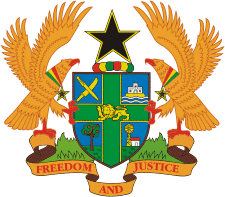 Space
Program of Ghana
Space
Program of Ghana
 Space
Program of Ghana
Space
Program of Ghana
------The Ghanan Space Agency------
|
Level = 0 Development: Very Low
What has been going on in Ghana?
What kind of space power do they have?
Does Ghana have space weapons?
What are they planning over there? |
|
Population: 23,000,000 / Language: English / GDP: $2500 / Cities: Accra
OVERVIEW
Ghana was the first place in sub-Saharan Africa where Europeans arrived to trade - first in gold, later in slaves.
It was also the first black African nation in the region to achieve independence from a colonial power, in this instance Britain.
Despite being rich in mineral resources, and endowed with a good education system and efficient civil service, Ghana fell victim to corruption and mismanagement soon after independence in 1957. In 1966 its first president and pan-African hero, Kwame Nkrumah, was deposed in a coup, heralding years of mostly-military rule. In 1981 Flight Lieutenant Jerry Rawlings staged his second coup. The country began to move towards economic stability and democracy.
In April 1992 a constitution allowing for a multi-party system was approved in a referendum, ushering in a period of democracy.
A well-administered country by regional standards, Ghana is often seen as a model for political and economic reform in Africa. Cocoa exports are an essential part of the economy; Ghana is the world's second-largest producer. It has a high-profile peacekeeping role; troops from Ghana have been deployed in Ivory Coast, Liberia, Sierra Leone and DR Congo.
Although Ghana has largely escaped the civil strife that has plagued other West African countries, in 1994-95 land disputes in the north erupted into ethnic violence, resulting in the deaths of 1,000 people and the displacement of a further 150,000.
President: John Kufuor John Kufuor won a second term in December 2004, in a presidential poll praised for being well-run and orderly. He came to power in the presidential ballot in December 2000, marking the first peaceful, democratic transfer of power in Ghana since independence. He succeeded the long-time ruler Jerry Rawlings.
Known as the "Gentle Giant", Mr Kufuor has made economic growth a priority. During his first term, inflation and borrowing costs fell.
|
Ghana's Space Infrastructure
Ghana is troubled by poverty and hunger, and its space program is not suprisingly, nonexistent. Not only does it not have an agency, but also not much of an infrastructure in which one would arise. The University of Ghana offers a degree in physics but nothing specific to space related educational architecture, such as astrophysics, astronomy, astronautics or aeronautics. The government has no ministry devoted to science of this type. Ghana has no history of being part of any organization dealing with space, nor has any launch capability. Ghana lacks the industrial base, the educational base and the political foundation for a process like this to occur within it. It has no functioning university with an astrophysics or astronautics program, and marginal industry. Ghana operates no satellites and, not having an orbital presence, has no space power. The government of Ghana in Kampala has no plans for attempting to further any ambition in space development or research.
|
None
|
TODAY AND INTO THE FUTURE
Nothing Planned
|